Recent Articles
Popular Makes
Body Types
10 Best Family Cars With Self-Driving Features for 2022
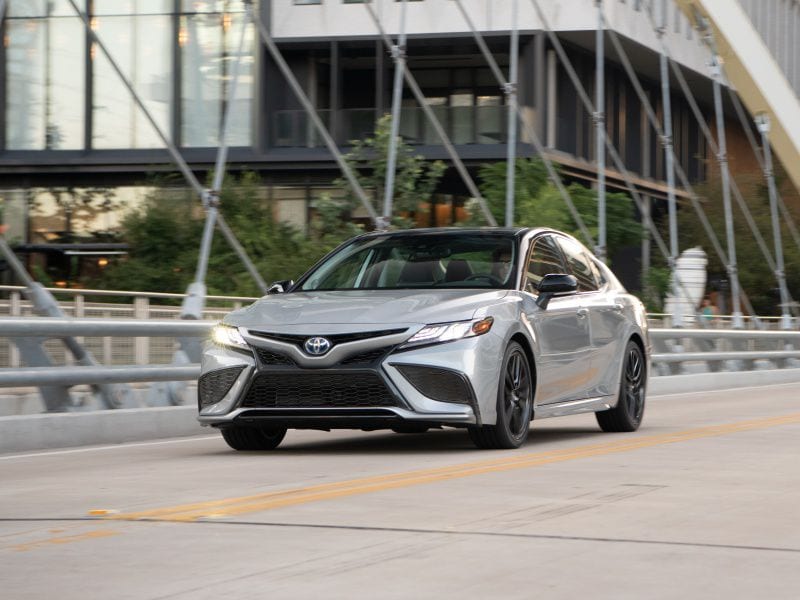
2021 Toyota Camry Hybrid XSE ・ Photo by Toyota
You might think self-driving cars are a futuristic dream — or even mere science fiction. But you don’t need a high-end luxury vehicle to get self-driving features today. Even many affordable family cars are packed with technologies that will accelerate, brake, and steer for you in certain cases. No, they won’t drive themselves, but all of them have advanced driver-assistance systems for superior convenience and safety.
Today, we’ve rounded up the 10 best family cars with self-driving features for 2022. All of these 10 cars are available with adaptive cruise control, which maintains a minimum distance from the car in front of you as it slows down and speeds back up; automatic emergency braking, which can autonomously slam the brakes to avoid or mitigate a collision; blind-spot monitoring, which looks over your shoulder to help prevent you from changing lanes into another vehicle; and a lane-departure warning that lets you know if you stray over the line. All but one of these cars also includes lane-keeping assistance, which automatically steers the car back into its lane if you stray over the edge. And beyond these technologies, these are also great family cars. Keep reading to see our choices, sorted by base price.
1. 2022 Nissan Kicks
Is the Nissan Kicks a car or an SUV? Whatever you call this subcompact tall-hatchback version of the Nissan Versa sedan, it’s a budget-friendly family car with lots of standard self-driving features.
The Kicks is sold only with front-wheel drive and a mere 122 horsepower. But you might be pleasantly surprised at how well this little car can fit your family inside. There’s also 25 cubic feet of cargo space behind its rear seat, nearly twice what you’d find in a sedan’s trunk. And even the rear seat has room for grownups or teens. Best of all, at a base price of just $19,600, the Kicks includes forward and reverse automatic emergency braking, blind-spot monitoring, and a lane-departure warning; adaptive cruise control arrives at a still-low $21,400. An EPA-estimated 33 mpg in mixed driving also keeps costs down. Especially if you’re looking for self-driving features, the Kicks is an appealing bargain. This is the only member of our list without lane-keeping assistance, but it’s also the most affordable.
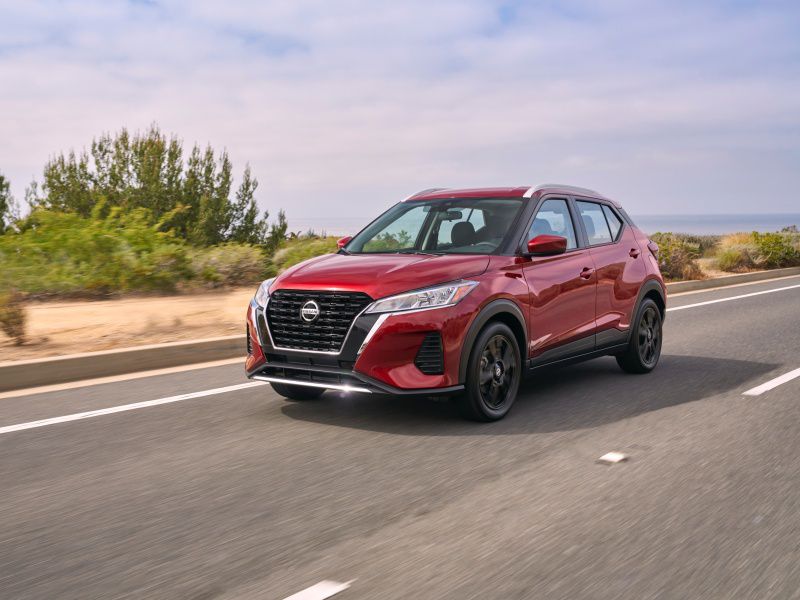
Photo by Nissan
2. 2022 Honda Civic
The compact Honda Civic of today could have been the mid-size Honda Accord a couple of decades ago. Newly redesigned for 2022 and sold as a four-door sedan and five-door hatchback, it’s spacious, refined, and luxuriously finished. It’s one of the best-driving small cars, yet it also has the most space inside and starts at a reasonable $21,900.
It’s packed with self-driving features, too, including adaptive cruise control, automatic emergency braking, and lane-keeping assistance. You need the EX model ($24,700) for blind-spot monitoring, which Honda oddly separates from a rear cross-traffic alert, which arrives only on the top-of-the-line Touring sedan ($28,300) and Sport Touring hatchback ($29,400). Still, there’s a lot of value in the Civic lineup even at those prices, including poised handling, a beautifully finished interior, and (on the EX, Touring, and Sport Touring) a peppy turbocharged engine.
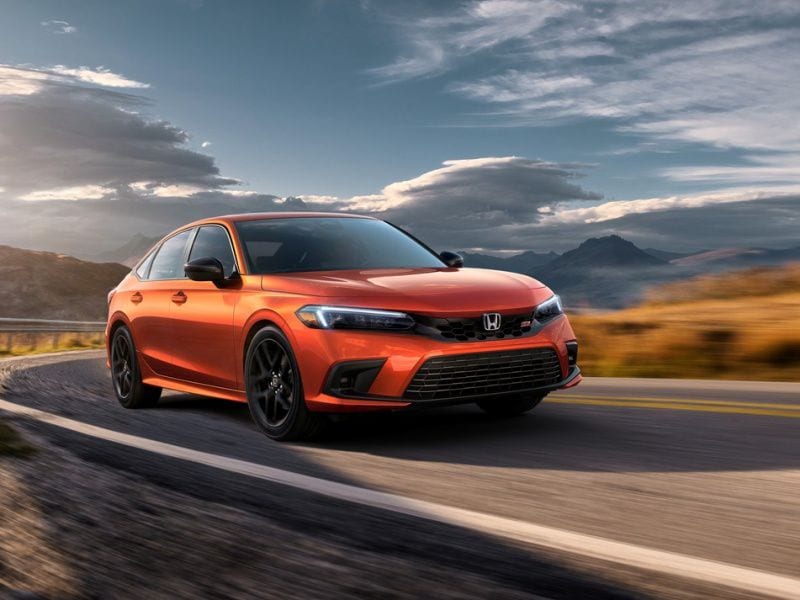
Photo by Honda
3. 2022 Subaru Legacy
Many families would prefer even more space than the roomiest compact car, and mid-size sedans make up most of our list. The least expensive of those is the 2022 Subaru Legacy.
Every Legacy includes Subaru’s EyeSight suite of driver aids: adaptive cruise control, forward automatic emergency braking, and lane-keep assist. All but the base model also offer blind-spot monitoring as an option or standard equipment, and most trims can also be had with rear automatic braking. Even all-wheel drive comes standard on every trim level. The Legacy wouldn’t be your first choice for design pizzazz, a high-end driving experience, or sporty performance, but it’s a family-friendly value that’s packed with self-driving features. Prices start at $22,995.
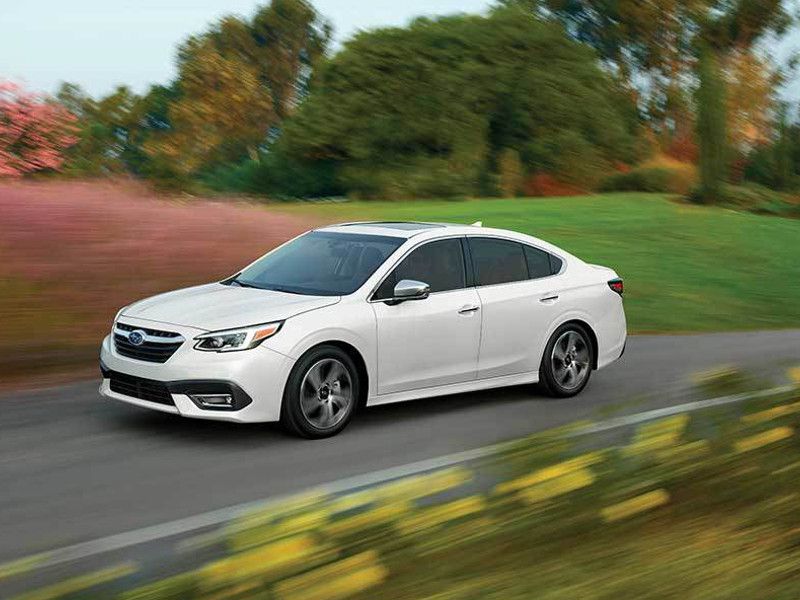
Photo by Subaru
4. 2022 Hyundai Sonata
The 2022 Hyundai Sonata is a flashy but comfortable and affordable mid-size sedan that’s packed with standard self-driving features: adaptive cruise control, forward automatic emergency braking, and lane-keeping assistance, all at a base price of $24,150. You won’t find all that on a base Kia K5, the Sonata’s corporate cousin. You can also add blind-spot monitoring (which includes camera displays on upper-trim Sonatas) and reverse automatic braking.
An unusual self-driving feature is Hyundai’s Smart Parking Assist, available on high-end trim levels. Just like your image of the future, this system does let the car drive with no one inside the vehicle, but it’s more like a remote-controlled car than true autonomy. Press and hold a keyfob button, and the Sonata will automatically drive forward or backward at your command, steering around obstacles and braking if necessary. You can use the system to get the car in or out of a tight parking spot where there wouldn’t be space to open your door, or just when it seems like a cool trick to show off. Other perks include a spacious rear seat, a well-finished interior, and a fuel-sipping hybrid option.
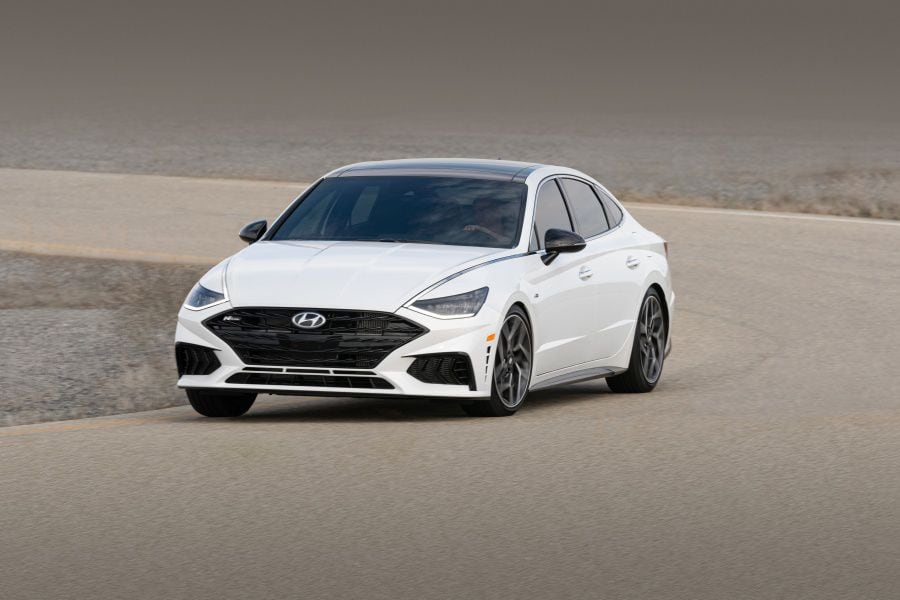
Photo by Hyundai
5. 2022 Toyota Prius
Turning back to small cars, the 2022 Toyota Prius is a fuel-sipping hybrid that’s big enough for many families. In addition to its famous blend of 50-plus mpg, futuristic styling, and the versatility of a five-door hatchback body, the Prius comes standard with valuable self-driving features: adaptive cruise control, automatic emergency braking, and lane-keeping assistance. And all but the base model include blind-spot monitoring.
The Prius isn’t a quick or quiet car, living up to the stereotype of hybrids being noisy and slow if you gun the engine. But you don’t buy the Prius to go fast. You buy it for a proven ability to sip gasoline even amid traffic congestion, year after year. We’re also fans of the Prius Prime plug-in hybrid, which can travel an EPA-estimated 25 miles per charge; however, families should note that the Prime’s bigger battery eats up some cargo room. The standard Prius starts at $24,525, and the Prius Prime is priced from $28,220 before a $4,502 federal tax credit.
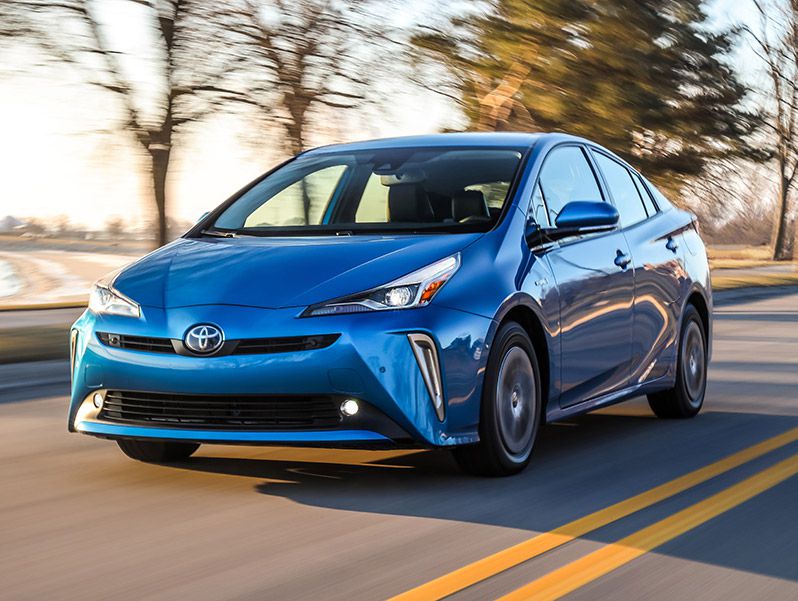
Photo by Toyota
6. 2022 Nissan Altima
The 2022 Nissan Altima mid-size sedan is a fantastic family car, with extra-cushy seats, great gas mileage, and easygoing yet fun driving manners. Even the base model ($24,550) includes forward automatic emergency braking and a lane-departure warning, while the next-up SV ($25,650) adds blind-spot monitoring and reverse automatic braking, along with other desirable features like alloy wheels and a bigger 8-inch infotainment screen.
Adaptive cruise control and lane-keeping assistance, which Nissan pairs under its ProPilot Assist name, are optional on the SV as part of an $1,800 option package and standard on the leather-trimmed SL and Platinum models. True, the Altima may not be the family car to buy if you’re dedicated to adaptive cruise control at the lowest price possible. There’s also no hybrid variant, and some interior details could be fancier. Still, we’re a fan of the Altima overall.
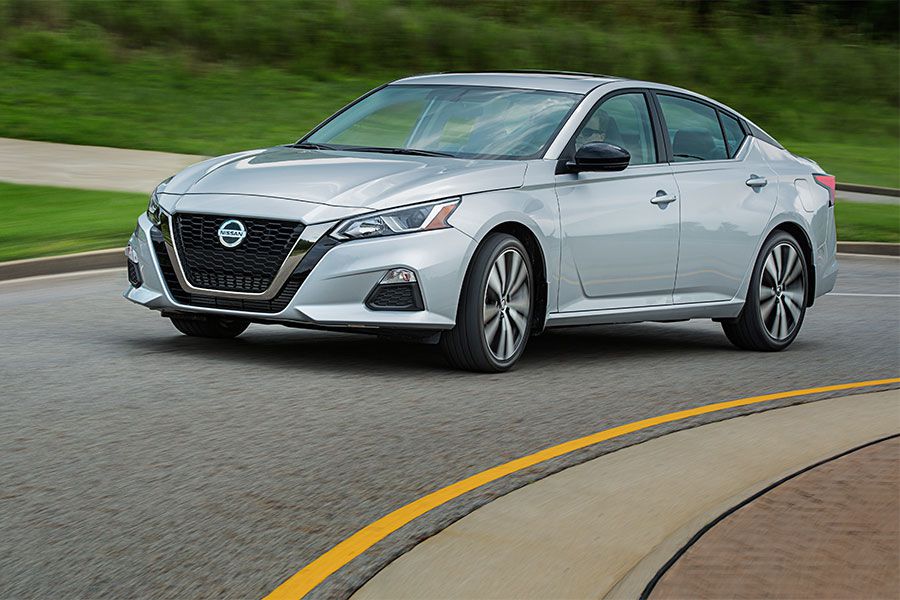
Photo by Nissan
7. 2022 Toyota Camry
While the 2022 Toyota Camry has a higher base price than many of its rivals ($25,295), it trumps most of them for standard self-driving features. These include adaptive cruise control, forward automatic emergency braking, and lane-keep assist. What’s more, the Camry has a peppy yet economical engine, a smooth ride yet agile handling, and cushy seats. And you can buy it as an extra-efficient hybrid or with an extra-powerful V6 engine instead.
Another plus for some buyers is that, unlike some high-tech cars, the Camry doesn’t beat you over the head with a cutting-edge vibe. If you just want a pleasant, user-friendly car that can step in for some driving tasks, the Camry delivers. Turning back to its safety gear, blind-spot monitoring is a $680 option on base models and standard on higher-end trim levels; these models, starting with the $30,045 XLE, also include reverse automatic braking and a more sophisticated adaptive cruise control system.
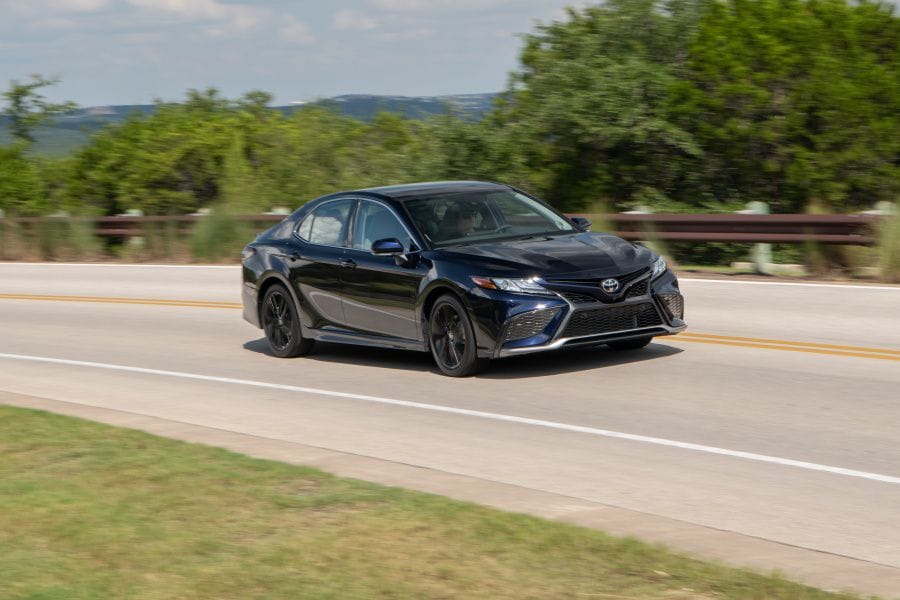
Photo by Toyota
8. 2022 Honda Accord
The 2022 Honda Accord not only has family-friendly interior room and fuel efficiency, but it’s also one of the best-driving mid-size sedans on the market. Credit goes to zippy turbocharged engines, sporty handling, and a composed ride.
But when you’re ready to let the car do some of the accelerating, braking, and steering for you, the Honda Sensing driver-assistance suite is standard equipment on all trim levels. That includes adaptive cruise control, automatic emergency braking, and lane-keep assist. Upper-trim Accords also add blind-spot monitoring and low-speed braking control — the latter designed to automatically stop the car if it’s about to drive or back into a small obstacle at speeds of 1 to 6 mph. Accord prices start at $25,470; while that’s higher than most competitors, this Honda’s upscale driving experience and meticulously finished interior could instead make it a bargain-priced premium sports sedan.
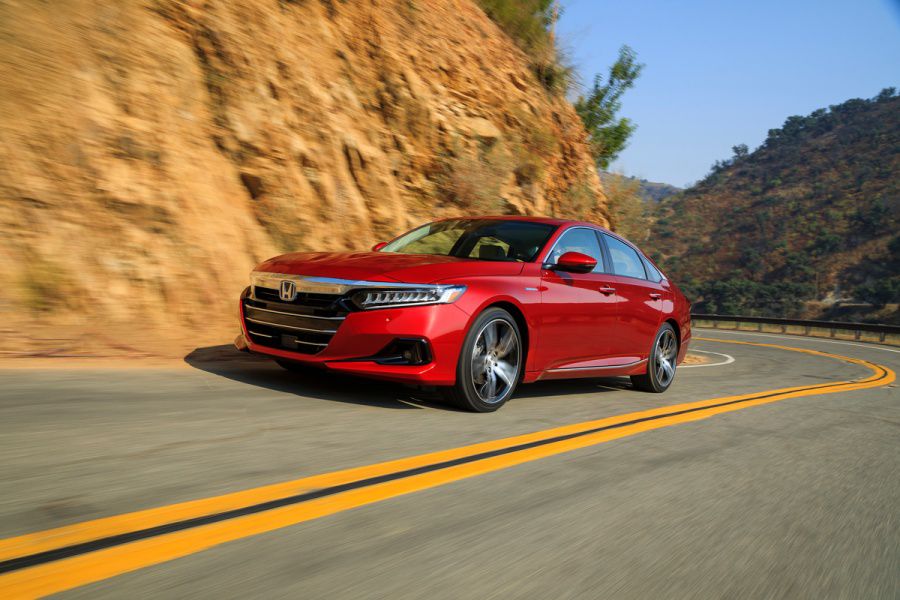
Photo by Honda
9. 2022 Volkswagen Passat
The 2022 Volkswagen Passat may seem like a curious choice for this list. Not only has the Passat gone a decade since a full redesign, but it even has a steep base price: $27,295. Still, unless you were planning to get a base-model family car, there’s a lot to love about the Passat even after all these years.
First, it’s loaded with standard self-driving features: automatic emergency braking, lane-keeping assistance, blind-spot monitoring, and adaptive cruise control. Heated leatherette upholstery and a sunroof are also standard. What’s more, the Passat has a great asset as a family car: a massive backseat. It’ll happily swallow lanky teenagers or rear-facing child safety seats. The Passat drives nicely, too. Its interior decor is growing stale, the 6.3-inch infotainment screen is tiny by today’s standards, and the peppy turbo engine is a couple miles per gallon behind the class leaders. But don’t count it out yet.
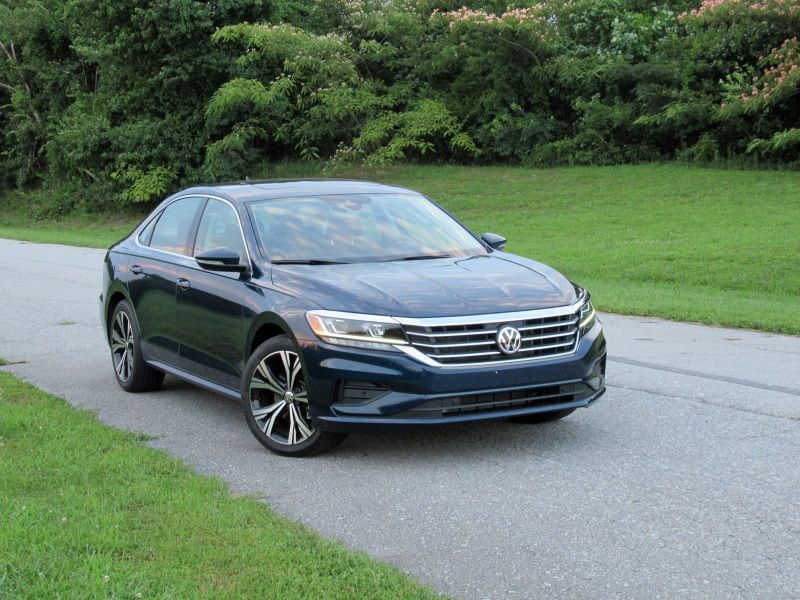
Photo by Brady Holt
10. 2022 Nissan Leaf
Another unusual choice will close our list of the best family cars with self-driving features. It’s the 2022 Nissan Leaf, a small all-electric hatchback. It’s not the right choice for every family. But for others, it’s an eco-friendly winner.
The Leaf travels an estimated 149 miles per charge on its standard battery, while an optional upgrade brings 215 miles along with speedier acceleration. Whichever Leaf you choose, you get a roomy and versatile interior for a compact hatchback. And its standard self-driving features include automatic emergency braking, lane-keep assist, and blind-spot monitoring; adaptive cruise control is available on all but the base models. Prices start at $27,400, which may seem high for a compact car — but Leaf buyers are also eligible for a $7,500 federal tax credit. If the backseat and the electric lifestyle fit your family, the Leaf can be the perfect family car with self-driving features.
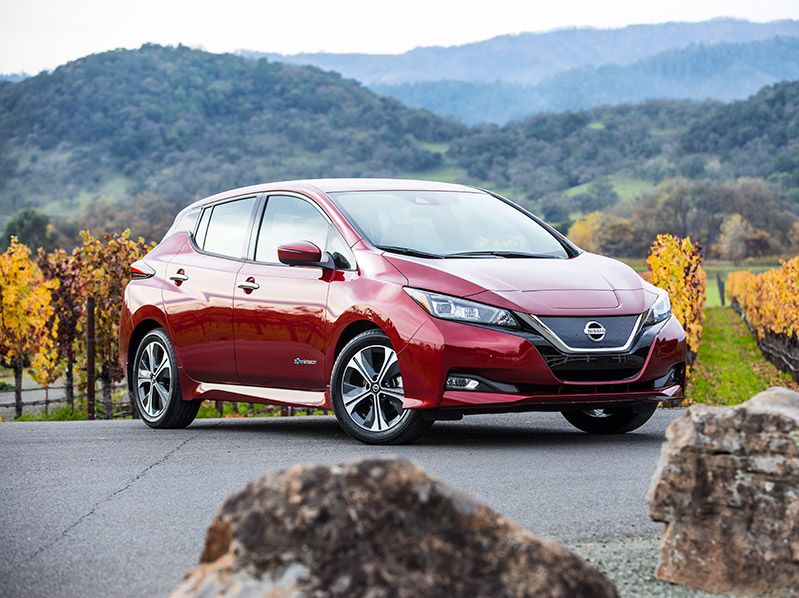
Photo by Nissan